2023届高三英语二轮复习高考专题复习之定语从句课件-(74张ppt)
文档属性
| 名称 | 2023届高三英语二轮复习高考专题复习之定语从句课件-(74张ppt) | 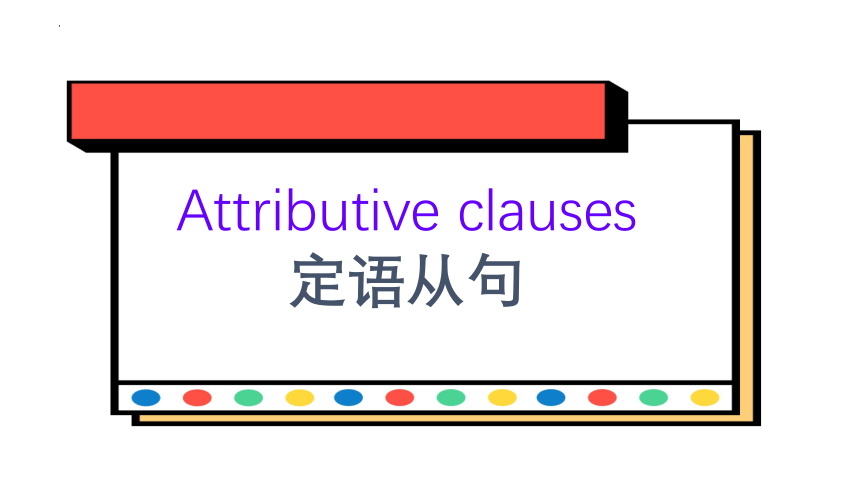 | |
| 格式 | pptx | ||
| 文件大小 | 4.9MB | ||
| 资源类型 | 教案 | ||
| 版本资源 | 通用版 | ||
| 科目 | 英语 | ||
| 更新时间 | 2022-12-04 20:57:16 | ||
图片预览

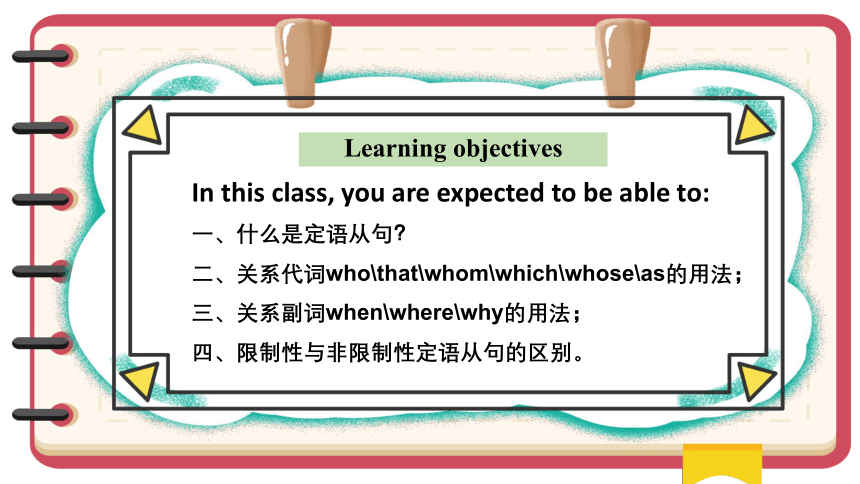
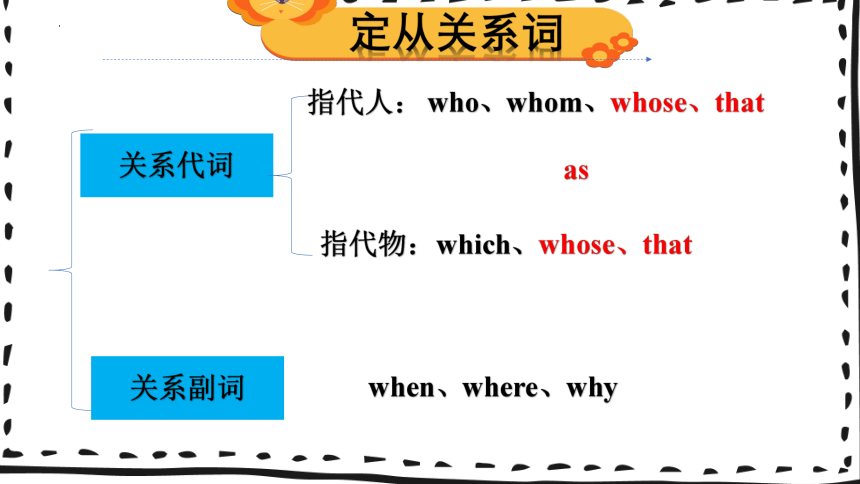
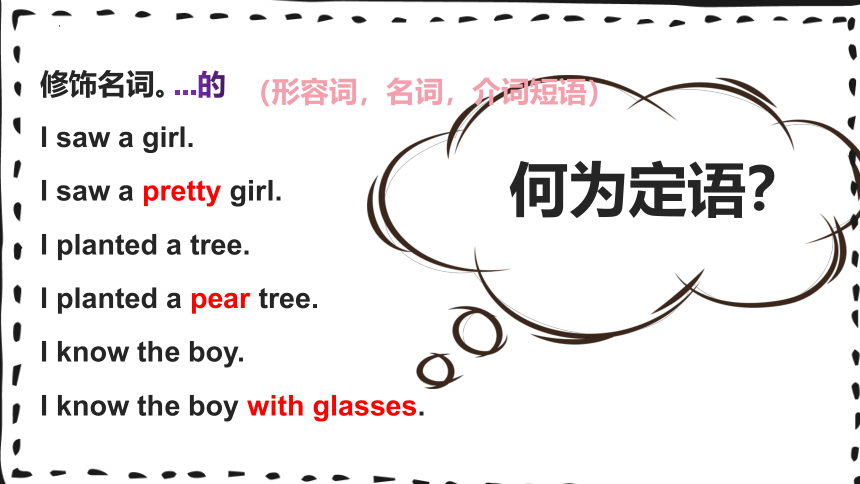
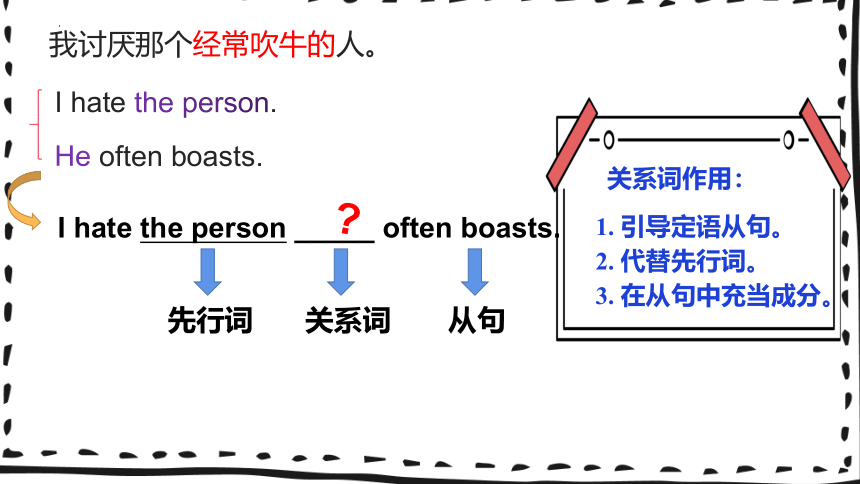
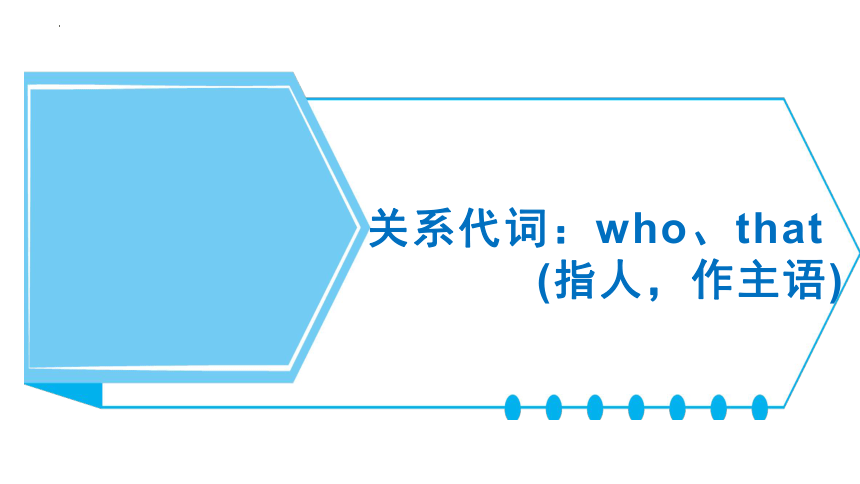
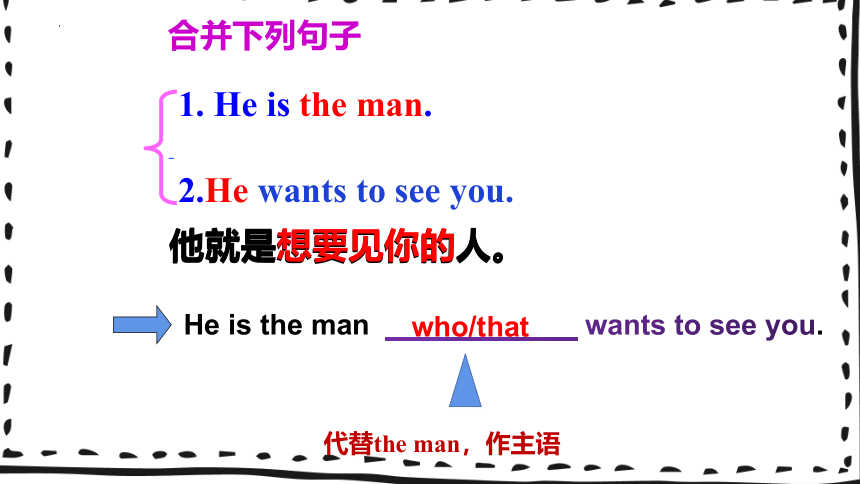
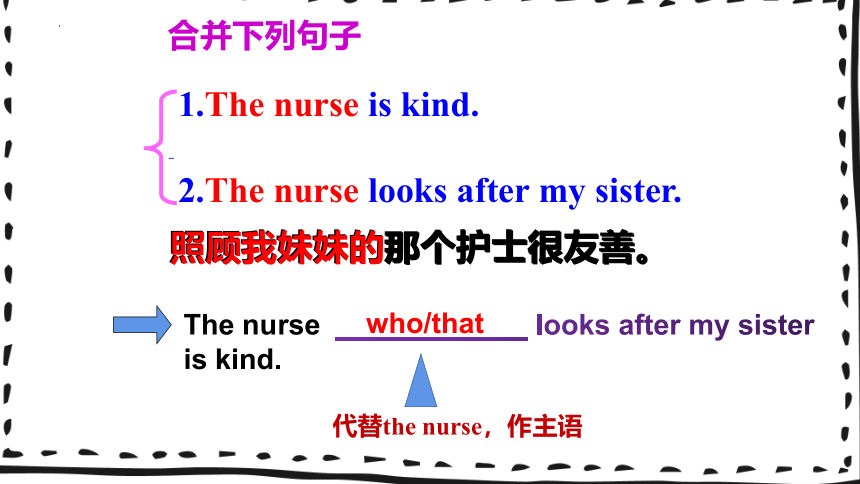
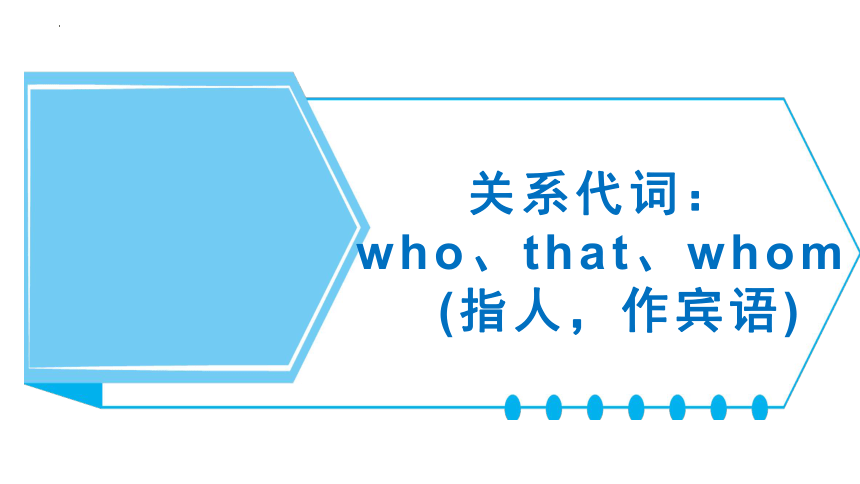
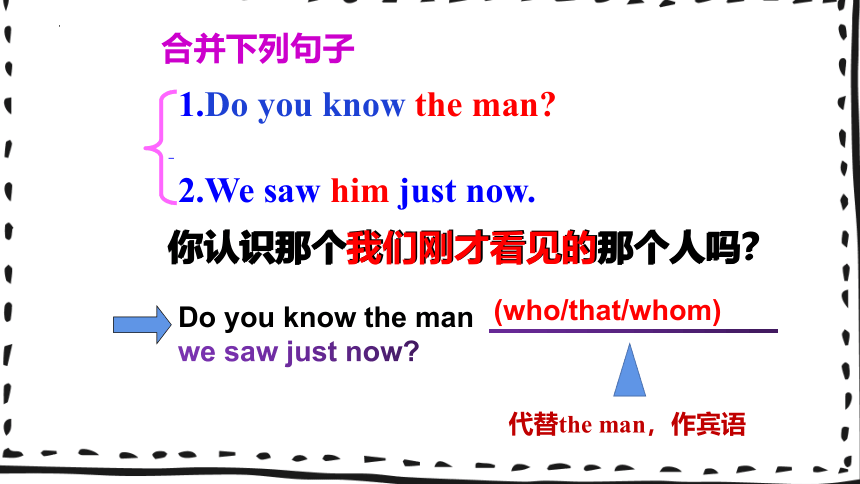
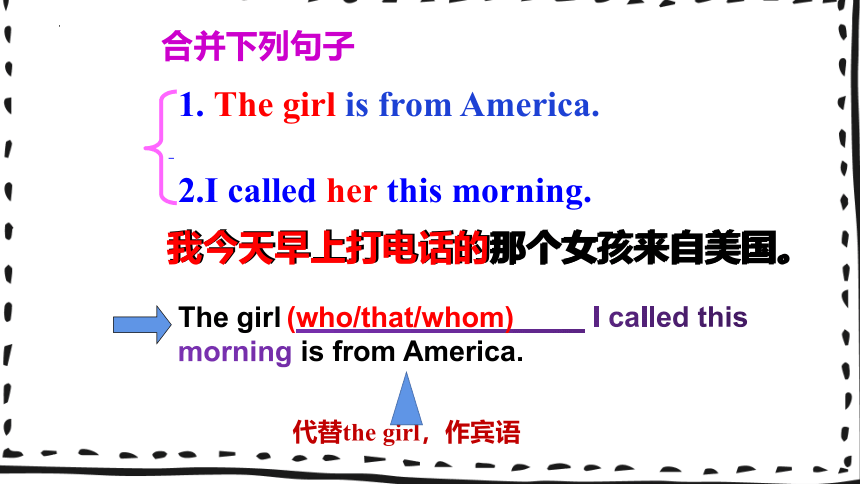
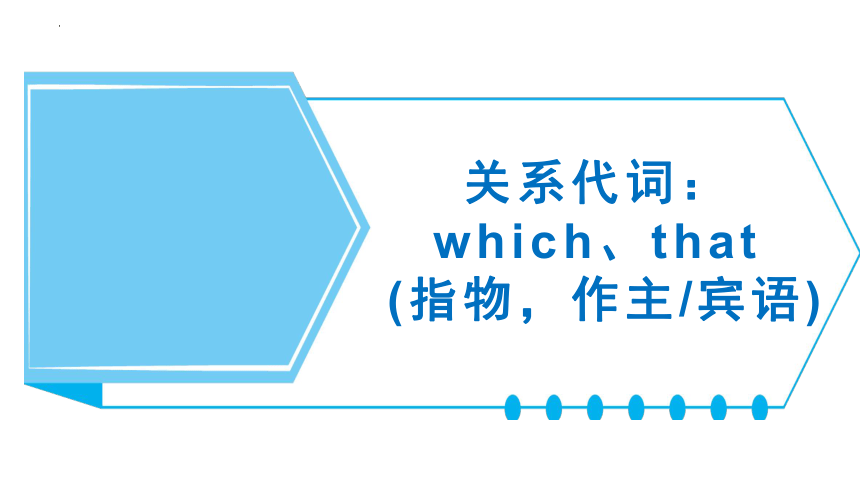
文档简介
(共74张PPT)
Attributive clauses
定语从句
Learning objectives
In this class, you are expected to be able to:
一、什么是定语从句?
二、关系代词who\that\whom\which\whose\as的用法;
三、关系副词when\where\why的用法;
四、限制性与非限制性定语从句的区别。
定从关系词
关系代词
关系副词
指代人:
who、whom、whose、that
指代物:
which、whose、that
as
when、where、why
何为定语?
修饰名词。
I saw a girl.
I saw a pretty girl.
I planted a tree.
I planted a pear tree.
I know the boy.
I know the boy with glasses.
...的
(形容词,名词,介词短语)
I hate the person.
He often boasts.
我讨厌那个经常吹牛的人。
I hate the person _____ often boasts.
先行词
关系词
从句
1. 引导定语从句。
2. 代替先行词。
3. 在从句中充当成分。
关系词作用:
关系代词:who、that
(指人,作主语)
1. He is the man.
2.He wants to see you.
他就是想要见你的人。
合并下列句子
他就是想要见你的人。
代替the man,作主语
He is the man ____________ wants to see you.
who/that
1.The nurse is kind.
2.The nurse looks after my sister.
照顾我妹妹的那个护士很友善。
合并下列句子
照顾我妹妹的那个护士很友善。
代替the nurse,作主语
The nurse ____________ looks after my sister is kind.
who/that
关系代词:
who、that、whom
(指人,作宾语)
1.Do you know the man
2.We saw him just now.
你认识那个我们刚才看见的那个人吗?
合并下列句子
你认识那个我们刚才看见的那个人吗?
代替the man,作宾语
Do you know the man __________________ we saw just now
(who/that/whom)
1. The girl is from America.
2.I called her this morning.
我今天早上打电话的那个女孩来自美国。
合并下列句子
我今天早上打电话的那个女孩来自美国。
代替the girl,作宾语
The girl __________________ I called this morning is from America.
(who/that/whom)
关系代词:
which、that
(指物,作主/宾语)
1.The workers planted the trees.
2.They didn't need much water.
工人们种了不需要很多水的树。
合并下列句子
工人们种了不需要很多水的树。
代替the trees,作主语
The workers planted the trees __________ didn't need much water.
which/that
1.The fish were not fresh.
2.We bought them yesterday.
我们昨天买的鱼不新鲜
合并下列句子
我们昨天买的鱼不新鲜。
代替the fish,作宾语
The fish ____________ we bought were not fresh.
(which/that)
翻译下面句子
这就是上周那位外国人参观的学校吗?
参观那个学校的外国人来自加拿大。
让我惊讶的事情是他说的话。
我教过的学生都很棒。
The foreighner who/that visited the school comes from Canada.
Is this the school (that/which) the foreigner visited last week
The thing which/that surprises me is his words .
The students (who/that/whom) I taught are very good .
关系代词:whose
(指人/物,作定语)
1.The rich lady often helps the little boy.
2.His parents died in an earthquake.
合并下列句子
那位有钱的女人经常帮助那个在一次地震中父母去世的男孩。
那位有钱的女人经常帮助那个在一次地震中父母去世的男孩。
The rich lady often helps the little boy ______ parents died in an earthquake.
The rich lady often helps the little boy ______ parents died in an earthquake.
his=the little boy's
三 当关系词在从句中做定语时,用whose,即 “whose+名词”。
whose
注意:此时先行词即可以是“人”,也可以是“物”。
1. The novel belongs to me.
2.Its cover was broken.
封面坏了的那本小说是我的。
合并下列句子
封面坏了的那本小说是我的。
代替novel,作定语
The novel ____________ cover was broken belongs to me.
whose
①、This is Tom, ____________father is a policeman.
=This is Tom, the father_______________ is a policeman.
=This is Tom, __________________the father is a policeman.
whose可修饰人,也可以修饰物。
可用… of whom或者…of which来替换
whose
of whom
of whom
②、I don't like the car ___________ colour is red.
=I don't like the car _____________ the colour is red.
=I don't like the car the colour ______________ is red.
whose
of which
of which
翻译下面句子
那个窗户面向南的房间是我的。
请不要靠近那个屋顶正在维修的房子。
他给了我一本封面是彩色的杂志。
The room whose window faces south is mine.
Don't get close to the house whose roof is under repair.
He gave me a magazine whose cover is colorful.
关系代词
as的用法
一、as 引导限制性定语从句
当先行词前有such, so, the same修饰,同时定语从句缺少主语或宾语时,应使用关系代词as, 例如:
We have found such materials as are used in their factory.
我们已经找到了像他们工厂里用的那种材料。
He lifted so heavy a stone as no one else can lift.
他搬起别人都搬不起的大石头。
要注意such/ so…as …引导的定语从句与such/ so…that 引导的状语从句的区别。例如:
He is such a clever boy ______ everyone likes.
He is such a clever boy ______ everyone likes him
【总结】
可以根据从句是否缺少成分来判断是选择as还是that。
that
as
典题直击
The book is written in_____easy English______ beginners can understand.
A.so; that B. such; that
C.so; as D.such; as
D
二、as引导非限制性定语从句
当as引导非限定从时,先行词为整个句子,同时在从句中担当主语或宾语的成分,可以翻译成“正如”,例如:
As is known to all, Taiwan belongs to China.
先行词
He is from the south, as we can know from his accent.
先行词
1. as引导非限定从与which的区别。
1)As we know, he is an honest person.
= He is an honest person, as we know.
= He, as we know, is an honest person.
2)He passed the test, which made his parents happy.
3)He failed the exam, which was unexpected.
1.位置上的不同:当先行词为一句话,as引导的非限定从可以放在主句后,主句前,或者把主句拆分,放在中间;而which引导的非限定从只能放在主句后。
2.含义上的不同: as 翻译成“正如”,而which 翻译成“这件事,这一点”。
3.当从句部分为否定句或者表示否定时只能用which。
4.as常用在as is often the case, as often happens, as has been pointed out, as is mentioned above, as we all know, as is known to all等结构中。
总 结
通常只能使用
that或which的场合
宜用that的情况:
1. 先行词为不定代词指“物”时,all, few, little, much, something, anything, nothing, 等不定代词或被不定代词修饰时。
你还有想要为自己说的任何话吗?
Do you have anything (that) you want to say
你应该把你所有你拥有的东西交上来。
You should hand in all (that) you have.
宜用that的情况:
2. 先行词被 the only, the very, just, the same, the last等限定词 修饰时。
这正是我在等的人。
This is the very person (that) I am waiting for.
唯一能让我高兴的东西就是钱。
The only thing that can make me happy is money.
宜用that的情况:
3. 先行词被最高级或序数词修饰时。
这是我听过最有趣的故事。
This is the most interesting story (that) I have ever heard.
我永远不会忘记老师给我们上的第一节课。
I will never forget the first lesson (that) our teacher gave us.
宜用that的情况:
4. 先行词既有人又有物时。
他们刚刚谈论了他们看见的那个男人和事。
They just talked about the man and the thing (that) they saw.
宜用that的情况:
5. 当主句是以which或who开头的疑问句。
在那边读书的那个人是谁。
Who is the man that is reading over there
宜用that的情况:
6. 当主句是以here, there开头时。
这就是你一直在找的旅馆。
Here is the hotel that you have been looking for.
在角上还有一个没有被占的位子。
There is a seat in the corner that is still not occupied.
小结
宜用that的情况:
1. 先行词为不定代词指“物”时,all, few, little, much, something, anything, nothing, 等不定代词或被不定代词修饰时。
2. 先行词被 the only, the very, just, the same, the last等限定词 修饰时。
3. 先行词被最高级或序数词修饰时。
4. 先行词既有人又有物时。
5. 当主句是以which或who开头的疑问句。
6. 当主句是以here, there开头时。
宜用which的情况:
1.引导非限制性定语从句时。
Football, which is a very interesting game, is played in many countries.
足球是很有趣的运动项目,很多国家都有这项运动。
宜用which的情况:
2.在定语从句中作介词的宾语,且介词位于关系代词前时。
I’ m looking for a container in which I can put these coins.
我想去找一个能盛下所有这些硬币的容器。
翻译下面句子
氧气是唯一可以助燃的气体吗?
这正是我想要的书。
他们谈论了在战争期间遇见过的人和事。
Is oxygen the only gas that can help fire burn
This is the very book that I want.
They talked about the people and things that they met during the war.
关系副词:when
(作时间状语)
when的用法
① When 引导定语从句时,先行词为表示时间的名词,关系词在从句中作时间状语,可用“介词+ which” 来替换。
I’ll never forget the day on which / (when) I joined the team .
I’ll never forget the day.
I joined the team on that day.
when作时间状语
★不能看到时间就用when看从句缺什么成分
I’ll never forget the day ______ I lived in the mountains.
I’ll never forget the day _______________ I spent in the mountains.
when
that/which/省略
when引导的定语从句修饰表示时间的名词
并在定语从句中作时间状语,相当于介词
(in/on/at/during)+which
I will never forget the day ________________ I first met you on the seashore.
on which / (when)
易混点辨析
when引导的定语从句和时间状语从句区别 关系词 定语从句 时间状语从句
when When引导定语从句时,表示时间的名词在从句中作主语或者宾语。 Winter is the year when the day is short while the night is long. 冬天是白天短而夜晚长的一年。 When引导状语从句时为从属连词。When前面没有表示时间的名词。此时,when不能用“介词+which”代替。When引导的时间状语从句可位于主句之前或主句之后。
I want to be a teacher when I grow up.
关系副词:where
(作地点状语)
where的用法
② Where 引导定语从句时,先行词为表示地点的名词,关系词在从句中作地点状语,可用“介词+ which” 来替换。
The school where / (in which) my son studies is near a park.
The school is near a park.
My son studies in this school.
where作地点状语
★不能看到地点就用where,看从句缺什么成分
This is the house _______ he was born.
This is the house _____________ was set up by his parents.
where
that/which
易错点辨析
当先行词表示具体地点的名词(如place, room, mountain, airport等)或表示抽象地点的名词(case, state, condition, point, situation等),且关系词在从句中作地点状语,定语从句用where引导。
He gets into a situation_________________ it is hard to tell what is right or wrong.
where/in which
关系副词:why
(作原因状语)
why的用法
③Why 引导定语从句时,先行词通常为reason,关系词在从句中作原因状语,可用“for+ which” 来替换。
Do you know the reason / (for which) why he is so upset
Do you know the reason.
He is so upset.
why作原因状语
★不能看到reason, 就用why.看从句缺什么成分
This is the reason _____ he was late.
This is the reason ____________he told us for his being late.
why
that/which
关系副词 相当于 被代替的先行词 在从句中作成分
where
when
why
in,at,on等介词+which
表示地点的名词
in,at,on,during等介词+which
地点状语
表示时间的名词
时间状语
for+which
reason
原因状语
小 结
如何选择关系代词VS关系副词
① 从句缺少主、宾、定
关系代词
关系副词
② 从句缺状语
Exercises
1. Do you still remember the first day _____________ you went to high school
2. I paid a visit to Fudan University _______________ my father studied thirty years ago.
3. Do you know the real reason ____________ Anne didn't go to the get-together
4. Tomorrow I will bring here the magazine for _______
you asked.
when/on which
where/ in which
why/for which
which
5. Peter put himself in a situation _________________ he had to leave the company.
6. There was a time __________________ my daughter was crazy about pop music.
7. The restaurant _______________ I have eaten a wonderful meal is going to close down.
8. There are two main reasons ______________ this situation has been allowed to continue.
where/in which
when/during which
where/in which
why/for which
Exercises
“介词+关系代词”引导的定语从句
当关系代词在定语从句中作介词的宾语时,我们通常用“介词+关系代词”引导定语从句。
如果指“人”,用“介词+whom”;
如果指“物”,用“介词+which”;
关系代词有时也用whose(作定语)。
如果指“物”,用“介词+which”
The pen is missing now.
I wrote with the pen.
The pen which I wrote with is missing now.
The pen with which I wrote is missing now.
合并
如果指“人”,用“介词+whom”
Xiao Li is my good friend.
I wrote a letter to him.
Xiao Li is my good friend whom I wrote a letter to .
Xiao Li is my good friend to whom I wrote a letter.
合并
He is the man in whom you can believe.
1. 看定语从句中动词或形容词与介词的搭配。
He gave me some books with which I am not very familiar.
2. 看介词与先行词搭配。
This is our classroom in which there is a teacher’s desk.
The farm on which my father works is far from the town.
3. 根据句意而定。
The soldier, without whom I wouldn't have suvived the earthquake, retired last week.
如何判断介词
限制性定语从句和
非限制性定语从句
1.The man who greeted me is my teacher.
2.John, who greeted me, is my teacher.
指出下面两个句子哪个是限制性定语从句哪个是非限制性定语从句。
限制性定语从句 非限制性定语从句
形式上 不用逗号“ ,”与主句隔开 用逗号“ ,”与主句隔开
意义上 是先行词不可缺少的定语,如删除,主句则失去意义或意思表达不完整 只是对先行词的补充说明,如删除,主句仍能表达完整的意思。
限制性定语从句和非限制性定语从句的区别
限制性定语从句和非限制性定语从句的区别
限制性定语从句 非限制性定语从句
关系词的使用上 1. 作宾语时可省略 1. 不可省略
2. 可用that 2. 不用that
1.引导非限制性定语从句的which可以指代前面的先行词,也可以指代前面整个句子。
He is late for school every day, which makes her teacher angry.
Water is very important, without which we can't live.
2.除which 外,还可用when, where, who, whom等关系副词或代词引导非限制性定语从句。
After graduation, I decided to stay in Chongqing, where I spent my childhood and four years of college life.
Albert Einstein left Germany for the United States during the World War II, when Jews were badly treated in Germany.
3.非限制性定语从句通常不能用that引导。
①. I like the book, that was bought yesterday.
②. I like the book which / that was bought yesterday.
which
4.非限制性定语从句不能用why引导要用for which代替why。
①. I had told them the reason, for which I didn’t attend the meeting.
②. I had told them the reason why I didn't attend the meeting.
综合练习
1、Many lessons are now available online, from __________ students can choose for free.
A. whose B. which C. when D. whom
2、Dr. Rowan, __________ secretary resigned two weeks ago, has had to do all his own typing.
A. whose B. that C. of which D. which
B
A
一从句,二成分,三先行词
综合练习
Now Irene Astbury works from 9am to 5pm daily at the pet shop in Macclesfield, 62 she opened with her late husband Les.
They were well trained by their masters 64 had great experience with caring for these animals.
which
who
一从句,二成分,三先行词
综合练习
In the cafe, customers will enjoy themselves in the historical environment what is created for them.
I eat all the food what is provided by Mom with appreciation.
which/that
that
一从句,二成分,三先行词
One afternoon where I was in primary school, I was walking by the school playground.
What students do at college seems to matter much more than ________ they go.
where→when
where
一从句,二成分,三先行词
一从句,二成分,三先行词
(2021年天津卷)William Hastie once suggested that history informs us of past mistakes ________ we can learn without repeating them.
A.from which B.in which C.with whom D.for whom
A
(2021年天津卷)At the Chinese art festival, there are different stands ________ artists demonstrate their skills and teach the visitors.
A.where B.which C.that D.when
A
写作运用
1. (2022·全国乙卷) 如图表所示,学生在课堂之外采用不同的方式学习英语。
As the chart shows, students adopt different ways to learn English beyond the classroom.
2. (2019·全国Ⅲ) 我给你写信的目的是邀请你参加下周六在我们学校举办的音乐节。(invite sb to do… music festival)
I’m writing to invite you to take part in the music festival which will be held in our school next Saturday.
Thank you
Attributive clauses
定语从句
Learning objectives
In this class, you are expected to be able to:
一、什么是定语从句?
二、关系代词who\that\whom\which\whose\as的用法;
三、关系副词when\where\why的用法;
四、限制性与非限制性定语从句的区别。
定从关系词
关系代词
关系副词
指代人:
who、whom、whose、that
指代物:
which、whose、that
as
when、where、why
何为定语?
修饰名词。
I saw a girl.
I saw a pretty girl.
I planted a tree.
I planted a pear tree.
I know the boy.
I know the boy with glasses.
...的
(形容词,名词,介词短语)
I hate the person.
He often boasts.
我讨厌那个经常吹牛的人。
I hate the person _____ often boasts.
先行词
关系词
从句
1. 引导定语从句。
2. 代替先行词。
3. 在从句中充当成分。
关系词作用:
关系代词:who、that
(指人,作主语)
1. He is the man.
2.He wants to see you.
他就是想要见你的人。
合并下列句子
他就是想要见你的人。
代替the man,作主语
He is the man ____________ wants to see you.
who/that
1.The nurse is kind.
2.The nurse looks after my sister.
照顾我妹妹的那个护士很友善。
合并下列句子
照顾我妹妹的那个护士很友善。
代替the nurse,作主语
The nurse ____________ looks after my sister is kind.
who/that
关系代词:
who、that、whom
(指人,作宾语)
1.Do you know the man
2.We saw him just now.
你认识那个我们刚才看见的那个人吗?
合并下列句子
你认识那个我们刚才看见的那个人吗?
代替the man,作宾语
Do you know the man __________________ we saw just now
(who/that/whom)
1. The girl is from America.
2.I called her this morning.
我今天早上打电话的那个女孩来自美国。
合并下列句子
我今天早上打电话的那个女孩来自美国。
代替the girl,作宾语
The girl __________________ I called this morning is from America.
(who/that/whom)
关系代词:
which、that
(指物,作主/宾语)
1.The workers planted the trees.
2.They didn't need much water.
工人们种了不需要很多水的树。
合并下列句子
工人们种了不需要很多水的树。
代替the trees,作主语
The workers planted the trees __________ didn't need much water.
which/that
1.The fish were not fresh.
2.We bought them yesterday.
我们昨天买的鱼不新鲜
合并下列句子
我们昨天买的鱼不新鲜。
代替the fish,作宾语
The fish ____________ we bought were not fresh.
(which/that)
翻译下面句子
这就是上周那位外国人参观的学校吗?
参观那个学校的外国人来自加拿大。
让我惊讶的事情是他说的话。
我教过的学生都很棒。
The foreighner who/that visited the school comes from Canada.
Is this the school (that/which) the foreigner visited last week
The thing which/that surprises me is his words .
The students (who/that/whom) I taught are very good .
关系代词:whose
(指人/物,作定语)
1.The rich lady often helps the little boy.
2.His parents died in an earthquake.
合并下列句子
那位有钱的女人经常帮助那个在一次地震中父母去世的男孩。
那位有钱的女人经常帮助那个在一次地震中父母去世的男孩。
The rich lady often helps the little boy ______ parents died in an earthquake.
The rich lady often helps the little boy ______ parents died in an earthquake.
his=the little boy's
三 当关系词在从句中做定语时,用whose,即 “whose+名词”。
whose
注意:此时先行词即可以是“人”,也可以是“物”。
1. The novel belongs to me.
2.Its cover was broken.
封面坏了的那本小说是我的。
合并下列句子
封面坏了的那本小说是我的。
代替novel,作定语
The novel ____________ cover was broken belongs to me.
whose
①、This is Tom, ____________father is a policeman.
=This is Tom, the father_______________ is a policeman.
=This is Tom, __________________the father is a policeman.
whose可修饰人,也可以修饰物。
可用… of whom或者…of which来替换
whose
of whom
of whom
②、I don't like the car ___________ colour is red.
=I don't like the car _____________ the colour is red.
=I don't like the car the colour ______________ is red.
whose
of which
of which
翻译下面句子
那个窗户面向南的房间是我的。
请不要靠近那个屋顶正在维修的房子。
他给了我一本封面是彩色的杂志。
The room whose window faces south is mine.
Don't get close to the house whose roof is under repair.
He gave me a magazine whose cover is colorful.
关系代词
as的用法
一、as 引导限制性定语从句
当先行词前有such, so, the same修饰,同时定语从句缺少主语或宾语时,应使用关系代词as, 例如:
We have found such materials as are used in their factory.
我们已经找到了像他们工厂里用的那种材料。
He lifted so heavy a stone as no one else can lift.
他搬起别人都搬不起的大石头。
要注意such/ so…as …引导的定语从句与such/ so…that 引导的状语从句的区别。例如:
He is such a clever boy ______ everyone likes.
He is such a clever boy ______ everyone likes him
【总结】
可以根据从句是否缺少成分来判断是选择as还是that。
that
as
典题直击
The book is written in_____easy English______ beginners can understand.
A.so; that B. such; that
C.so; as D.such; as
D
二、as引导非限制性定语从句
当as引导非限定从时,先行词为整个句子,同时在从句中担当主语或宾语的成分,可以翻译成“正如”,例如:
As is known to all, Taiwan belongs to China.
先行词
He is from the south, as we can know from his accent.
先行词
1. as引导非限定从与which的区别。
1)As we know, he is an honest person.
= He is an honest person, as we know.
= He, as we know, is an honest person.
2)He passed the test, which made his parents happy.
3)He failed the exam, which was unexpected.
1.位置上的不同:当先行词为一句话,as引导的非限定从可以放在主句后,主句前,或者把主句拆分,放在中间;而which引导的非限定从只能放在主句后。
2.含义上的不同: as 翻译成“正如”,而which 翻译成“这件事,这一点”。
3.当从句部分为否定句或者表示否定时只能用which。
4.as常用在as is often the case, as often happens, as has been pointed out, as is mentioned above, as we all know, as is known to all等结构中。
总 结
通常只能使用
that或which的场合
宜用that的情况:
1. 先行词为不定代词指“物”时,all, few, little, much, something, anything, nothing, 等不定代词或被不定代词修饰时。
你还有想要为自己说的任何话吗?
Do you have anything (that) you want to say
你应该把你所有你拥有的东西交上来。
You should hand in all (that) you have.
宜用that的情况:
2. 先行词被 the only, the very, just, the same, the last等限定词 修饰时。
这正是我在等的人。
This is the very person (that) I am waiting for.
唯一能让我高兴的东西就是钱。
The only thing that can make me happy is money.
宜用that的情况:
3. 先行词被最高级或序数词修饰时。
这是我听过最有趣的故事。
This is the most interesting story (that) I have ever heard.
我永远不会忘记老师给我们上的第一节课。
I will never forget the first lesson (that) our teacher gave us.
宜用that的情况:
4. 先行词既有人又有物时。
他们刚刚谈论了他们看见的那个男人和事。
They just talked about the man and the thing (that) they saw.
宜用that的情况:
5. 当主句是以which或who开头的疑问句。
在那边读书的那个人是谁。
Who is the man that is reading over there
宜用that的情况:
6. 当主句是以here, there开头时。
这就是你一直在找的旅馆。
Here is the hotel that you have been looking for.
在角上还有一个没有被占的位子。
There is a seat in the corner that is still not occupied.
小结
宜用that的情况:
1. 先行词为不定代词指“物”时,all, few, little, much, something, anything, nothing, 等不定代词或被不定代词修饰时。
2. 先行词被 the only, the very, just, the same, the last等限定词 修饰时。
3. 先行词被最高级或序数词修饰时。
4. 先行词既有人又有物时。
5. 当主句是以which或who开头的疑问句。
6. 当主句是以here, there开头时。
宜用which的情况:
1.引导非限制性定语从句时。
Football, which is a very interesting game, is played in many countries.
足球是很有趣的运动项目,很多国家都有这项运动。
宜用which的情况:
2.在定语从句中作介词的宾语,且介词位于关系代词前时。
I’ m looking for a container in which I can put these coins.
我想去找一个能盛下所有这些硬币的容器。
翻译下面句子
氧气是唯一可以助燃的气体吗?
这正是我想要的书。
他们谈论了在战争期间遇见过的人和事。
Is oxygen the only gas that can help fire burn
This is the very book that I want.
They talked about the people and things that they met during the war.
关系副词:when
(作时间状语)
when的用法
① When 引导定语从句时,先行词为表示时间的名词,关系词在从句中作时间状语,可用“介词+ which” 来替换。
I’ll never forget the day on which / (when) I joined the team .
I’ll never forget the day.
I joined the team on that day.
when作时间状语
★不能看到时间就用when看从句缺什么成分
I’ll never forget the day ______ I lived in the mountains.
I’ll never forget the day _______________ I spent in the mountains.
when
that/which/省略
when引导的定语从句修饰表示时间的名词
并在定语从句中作时间状语,相当于介词
(in/on/at/during)+which
I will never forget the day ________________ I first met you on the seashore.
on which / (when)
易混点辨析
when引导的定语从句和时间状语从句区别 关系词 定语从句 时间状语从句
when When引导定语从句时,表示时间的名词在从句中作主语或者宾语。 Winter is the year when the day is short while the night is long. 冬天是白天短而夜晚长的一年。 When引导状语从句时为从属连词。When前面没有表示时间的名词。此时,when不能用“介词+which”代替。When引导的时间状语从句可位于主句之前或主句之后。
I want to be a teacher when I grow up.
关系副词:where
(作地点状语)
where的用法
② Where 引导定语从句时,先行词为表示地点的名词,关系词在从句中作地点状语,可用“介词+ which” 来替换。
The school where / (in which) my son studies is near a park.
The school is near a park.
My son studies in this school.
where作地点状语
★不能看到地点就用where,看从句缺什么成分
This is the house _______ he was born.
This is the house _____________ was set up by his parents.
where
that/which
易错点辨析
当先行词表示具体地点的名词(如place, room, mountain, airport等)或表示抽象地点的名词(case, state, condition, point, situation等),且关系词在从句中作地点状语,定语从句用where引导。
He gets into a situation_________________ it is hard to tell what is right or wrong.
where/in which
关系副词:why
(作原因状语)
why的用法
③Why 引导定语从句时,先行词通常为reason,关系词在从句中作原因状语,可用“for+ which” 来替换。
Do you know the reason / (for which) why he is so upset
Do you know the reason.
He is so upset.
why作原因状语
★不能看到reason, 就用why.看从句缺什么成分
This is the reason _____ he was late.
This is the reason ____________he told us for his being late.
why
that/which
关系副词 相当于 被代替的先行词 在从句中作成分
where
when
why
in,at,on等介词+which
表示地点的名词
in,at,on,during等介词+which
地点状语
表示时间的名词
时间状语
for+which
reason
原因状语
小 结
如何选择关系代词VS关系副词
① 从句缺少主、宾、定
关系代词
关系副词
② 从句缺状语
Exercises
1. Do you still remember the first day _____________ you went to high school
2. I paid a visit to Fudan University _______________ my father studied thirty years ago.
3. Do you know the real reason ____________ Anne didn't go to the get-together
4. Tomorrow I will bring here the magazine for _______
you asked.
when/on which
where/ in which
why/for which
which
5. Peter put himself in a situation _________________ he had to leave the company.
6. There was a time __________________ my daughter was crazy about pop music.
7. The restaurant _______________ I have eaten a wonderful meal is going to close down.
8. There are two main reasons ______________ this situation has been allowed to continue.
where/in which
when/during which
where/in which
why/for which
Exercises
“介词+关系代词”引导的定语从句
当关系代词在定语从句中作介词的宾语时,我们通常用“介词+关系代词”引导定语从句。
如果指“人”,用“介词+whom”;
如果指“物”,用“介词+which”;
关系代词有时也用whose(作定语)。
如果指“物”,用“介词+which”
The pen is missing now.
I wrote with the pen.
The pen which I wrote with is missing now.
The pen with which I wrote is missing now.
合并
如果指“人”,用“介词+whom”
Xiao Li is my good friend.
I wrote a letter to him.
Xiao Li is my good friend whom I wrote a letter to .
Xiao Li is my good friend to whom I wrote a letter.
合并
He is the man in whom you can believe.
1. 看定语从句中动词或形容词与介词的搭配。
He gave me some books with which I am not very familiar.
2. 看介词与先行词搭配。
This is our classroom in which there is a teacher’s desk.
The farm on which my father works is far from the town.
3. 根据句意而定。
The soldier, without whom I wouldn't have suvived the earthquake, retired last week.
如何判断介词
限制性定语从句和
非限制性定语从句
1.The man who greeted me is my teacher.
2.John, who greeted me, is my teacher.
指出下面两个句子哪个是限制性定语从句哪个是非限制性定语从句。
限制性定语从句 非限制性定语从句
形式上 不用逗号“ ,”与主句隔开 用逗号“ ,”与主句隔开
意义上 是先行词不可缺少的定语,如删除,主句则失去意义或意思表达不完整 只是对先行词的补充说明,如删除,主句仍能表达完整的意思。
限制性定语从句和非限制性定语从句的区别
限制性定语从句和非限制性定语从句的区别
限制性定语从句 非限制性定语从句
关系词的使用上 1. 作宾语时可省略 1. 不可省略
2. 可用that 2. 不用that
1.引导非限制性定语从句的which可以指代前面的先行词,也可以指代前面整个句子。
He is late for school every day, which makes her teacher angry.
Water is very important, without which we can't live.
2.除which 外,还可用when, where, who, whom等关系副词或代词引导非限制性定语从句。
After graduation, I decided to stay in Chongqing, where I spent my childhood and four years of college life.
Albert Einstein left Germany for the United States during the World War II, when Jews were badly treated in Germany.
3.非限制性定语从句通常不能用that引导。
①. I like the book, that was bought yesterday.
②. I like the book which / that was bought yesterday.
which
4.非限制性定语从句不能用why引导要用for which代替why。
①. I had told them the reason, for which I didn’t attend the meeting.
②. I had told them the reason why I didn't attend the meeting.
综合练习
1、Many lessons are now available online, from __________ students can choose for free.
A. whose B. which C. when D. whom
2、Dr. Rowan, __________ secretary resigned two weeks ago, has had to do all his own typing.
A. whose B. that C. of which D. which
B
A
一从句,二成分,三先行词
综合练习
Now Irene Astbury works from 9am to 5pm daily at the pet shop in Macclesfield, 62 she opened with her late husband Les.
They were well trained by their masters 64 had great experience with caring for these animals.
which
who
一从句,二成分,三先行词
综合练习
In the cafe, customers will enjoy themselves in the historical environment what is created for them.
I eat all the food what is provided by Mom with appreciation.
which/that
that
一从句,二成分,三先行词
One afternoon where I was in primary school, I was walking by the school playground.
What students do at college seems to matter much more than ________ they go.
where→when
where
一从句,二成分,三先行词
一从句,二成分,三先行词
(2021年天津卷)William Hastie once suggested that history informs us of past mistakes ________ we can learn without repeating them.
A.from which B.in which C.with whom D.for whom
A
(2021年天津卷)At the Chinese art festival, there are different stands ________ artists demonstrate their skills and teach the visitors.
A.where B.which C.that D.when
A
写作运用
1. (2022·全国乙卷) 如图表所示,学生在课堂之外采用不同的方式学习英语。
As the chart shows, students adopt different ways to learn English beyond the classroom.
2. (2019·全国Ⅲ) 我给你写信的目的是邀请你参加下周六在我们学校举办的音乐节。(invite sb to do… music festival)
I’m writing to invite you to take part in the music festival which will be held in our school next Saturday.
Thank you
